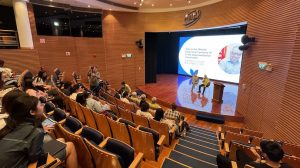
As the world struggles with the economic impact of the COVID-19 pandemic, entrepreneurial skills can play an important role in business recovery, suggests IFTM Assistant Professor Dr. Fernando Lourenço, who specialises in the study and teaching of entrepreneurship.
“Teaching entrepreneurship is also about equipping graduates with a survival skill,” he says. Dr. Lourenço adds that an enterprising outlook can help professionals create new career opportunities when faced with unforeseen circumstances either at a personal level or at a more macro scale during economic downturns, including the current one caused by COVID-19.
“Apart from economic development and job generation, entrepreneurship stimulates innovation, enhances standard of living, and also impacts community development,” Dr. Lourenço says.
While in other places, business-starting might have an important role in net job generation, in Macao the emphasis is more on widening the range of careers available locally, the IFTM scholar adds. Adoption of an entrepreneurial approach could additionally stimulate Macao people to explore business opportunities beyond the city, including in the other cities making up the Guangdong-Hong Kong-Macao Greater Bay Area.
IFTM has been a leader among higher education institutions in Macao in promoting enthusiasm for entrepreneurship. Dr. Lourenço has played a seminal role in such push. He designed IFTM’s first course on entrepreneurship, launched in 2013, and now all IFTM bachelor degree students have access to education in the subject.
The Institute’s focus on entrepreneurship aims to contribute toward Macao’s goal of achieving economic diversification. It complements the Macao SAR Government’s efforts regarding active promotion of developing business-formation skills among the city’s young people.
“Entrepreneurship education in higher education is important because it expands the perspective of students and graduates,” Dr. Lourenço says. He explains that, although the typical aim of a higher education institution is to produce graduates who are ready to join the labour market, “there is growing consensus” that tertiary education should also help “empower students and graduates to see that they can start and grow their own businesses”.
He adds: “The typical career path assumed by graduates is employment. But we should inform students that they can be entrepreneurial within an organisation – also known as ‘intrapreneurship’ – and even become entrepreneurs who start and grow their own organisation.”
Partnering with local businesses
Education on entrepreneurship commenced at an international level in the 1980s and has involved significantly since. Dr. Lourenço has developed a unique approach to the subject. It includes not only providing students with knowledge and opportunities to reflect on it, but also gives them a chance to apply what they have learned in order to develop enterprising behaviour, skills, and other attributes.
“Most importantly, we should create real-world situations for students to experiment in aspects of entrepreneurship, to allow them to ‘learn by doing’,” Dr. Lourenço says. He makes a point to include in his courses hands-on assignments that require students to engage with business for entrepreneurial projects.
Through his courses, IFTM students have been involved over the years in a range of hands-on undertakings, supporting the development of local businesses. Examples include provision of consulting services to luxury hotels in Macao, supporting the market launch of an automated egg waffle machine, and helping with testing of a smartphone application developed by a Macao start-up, meant to give tour guides in Macao a way to advertise and sell their services and products direct to tourists.
“In most of the cases, the research output produced by students – including market research and industry analysis – is used by clients,” Dr. Lourenço says.
He applies a particular framework in selecting projects for his students. It aims to bring a total of ‘5 wins’ to the various stakeholders involved, Dr. Lourenço explains. His criteria are that a project should, first, offer students experience of the real world, capable of enriching their own résumé; second, it should generate results valuable for the clients/parties involved; third, it should improve the teaching at IFTM and the specific degree programme tied to the project; fourth, it should build up the overall quality of IFTM’s educational work; and fifth, it should have a positive effect on Macao.
According to the IFTM scholar, identifying opportunities for real-world consultancy projects for students is an ongoing task. “I never switch off my antenna,” he says. “Ideas for a project normally come after a brief discussion with the client. Subsequently, I will develop the full project brief for the client and after a few rounds of revision the client is ready to give it the green light.”
Work done for the IFTM courses on entrepreneurship has led some undergraduates to launch their own businesses, often with support from Dr. Lourenço. Some graduates have established their own ventures either after completing their studies at IFTM or after a few years of industry experience.
“Before they try anything out, they really need to think carefully,” Dr. Lourenço warns. “They should conduct some sort of formal or informal business planning to develop their business ideas, plan their strategy, and find resources to aid their project.”
He adds: “Opportunities are not given, they are made. Good business ideas don’t exist, they are created.”
Dr. Lourenço additionally makes a point of saying that business-starting is not necessarily better than being an employee of a company. “We can find success in any path,” he states. “What matters is to act with entrepreneurial spirit, and to keep learning, keep innovating and keep improving. Most importantly, enjoy the process of self-development.”








